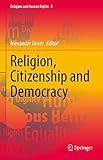Religion, Citizenship and Democracy / edited by Alexander Unser
Material type: TextSeries: Religion and Human Rights ; 8Publisher: Cham : Springer International Publishing, 2021Publisher: Cham : Imprint: Springer, 2021Edition: 1st ed. 2021Description: 274 Seiten IllustrationenISBN:
TextSeries: Religion and Human Rights ; 8Publisher: Cham : Springer International Publishing, 2021Publisher: Cham : Imprint: Springer, 2021Edition: 1st ed. 2021Description: 274 Seiten IllustrationenISBN: - 9783030832766
| Item type | Current library | Collection | Call number | Status | Date due | Barcode | |
|---|---|---|---|---|---|---|---|
 Book
Book
|
Maecenata Bibliothek | BC/600 Zivilgesellschaft und Religion | BC 600 48 | Available |
Chapter 1. Religion, Citizenship and Democracy: A theoretical and methodical framework for future research (Unser) -- Chapter 2. Are religious people better democratic citizens? (Ziebertz) -- Chapter 3. Democratisation as a professional task? Pastors of the Protestant Church in Germany and their public role (Menzel) -- Chapter 4. No citizenship for Ruth? (Ostmeyer) -- Chapter 5. The Income Inequality Gap and its Effect on Citizenship, Democracy, and Religion (Webb) -- Chapter 6. Religion, democracy and citizenship - exploring the relations among Swedish youth (Sjöborg) -- Chapter 7. Relationship between religion, citizenship and democracy among youths: a case of Tanzania (Fumbo) -- Chapter 8. Judaism and Citizenship: The Attitudes of Religious Female Adolescents in Israel to Democracy (Gross) -- Chapter 9. Attitudes toward religion and democracy among young people in Pakistan and Palestine (Webb) -- Chapter 10. Religious Worldviews, Citizenship and Social conviviality in Malta (Gellel) -- Chapter 11. Ridiculing of religious minorities in the media - part of a new xenophobic worldview? (Botvar) -- Chapter 12. Countering anti-Jewish attitudes among Christian and religiously unaffiliated youth - Testing the contact hypothesis (Francis) -- Chapter 13. Metaphoric perceptions of political immigrants towards the concept of citizens (Ozdemir) -- Chapter 14. A qualitative and comparative study on the views and practices of primary school teachers in Germany and Turkey to the teaching of the concept of democracy (Kaya) -- Chapter 15. Educating for civil society and democracy in non-formal programs of religious education - the example of confirmation work (Schweitzer) -- Chapter 16. Democratic and citizenship education at faith-based schools. Conceptual deliberations and empirical insights (Pirner) -- Chapter 17. Attempting a connection between teenagers' religious consciousness and citizenship education in the Greek educational system (Potamousi) -- Chapter 18. Normative Citizenship Education in Plural Societies (Avest) -- Chapter 19. Education in the face of Communalism and Cosmopolitan Citizenship (Anthony).
This innovative volume is focused on the impact of religion on the realization of democratic citizenship. The researchers contributing provide empirical evidence on how religion influences attitudes towards citizenship and democracy in different countries. The book also tackles the challenges and opportunities for citizenship education. Experts contributing from sociology, political science, theology, and educational science look at the impact of religious beliefs and practices on democratic attitudes and behavior. Chapters also concern how religion influences the recognition of others as citizens. The text appeals to graduates and researchers in these fields with a secondary market for the general interest reader.
There are no comments on this title.

